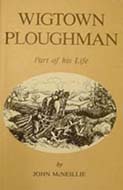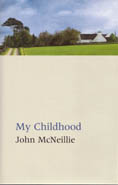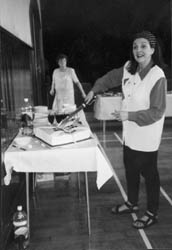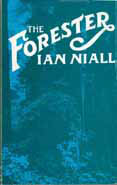Wigtown Ploughman
 The John McNeillie Library in Wigtown’s County Building contains the author’s own collection of books, among them his first novel, Wigtown Ploughman, the life of Andrew Walker, a dark, Gillespie-like figure. Serialised in Glasgow’s Sunday Mail in 1939, it caused a stir on account of its depiction of the way of life and conditions then commonplace in Scottish rural society, but shocking to genteel sensibilities. To mark the occasion of the opening of the library, local writer and bookseller Rosemary Baker delivered a personal perspective on the Wigtown Ploughman: ‘Quiche and Masculinity’. In this trenchant disquisiton, presented below, she took as her starting point the title of Bruce Feinstein’s book, Real Men Don’t Eat Quiche, pointing out the implied correlation – ‘real men live on meat pies, beans and chips’.
The John McNeillie Library in Wigtown’s County Building contains the author’s own collection of books, among them his first novel, Wigtown Ploughman, the life of Andrew Walker, a dark, Gillespie-like figure. Serialised in Glasgow’s Sunday Mail in 1939, it caused a stir on account of its depiction of the way of life and conditions then commonplace in Scottish rural society, but shocking to genteel sensibilities. To mark the occasion of the opening of the library, local writer and bookseller Rosemary Baker delivered a personal perspective on the Wigtown Ploughman: ‘Quiche and Masculinity’. In this trenchant disquisiton, presented below, she took as her starting point the title of Bruce Feinstein’s book, Real Men Don’t Eat Quiche, pointing out the implied correlation – ‘real men live on meat pies, beans and chips’.
John McNellie’s Ploughman has never heard of quiche. At the same time meat pies are beyond his means. Fortunately, such matters have absolutely nothing to do with manhood. Andy Walker, raised from the Wigtownshire soil on porridge, broth, and turnips, with the occasional jam scone, is a ‘real man’, one of the best and worst of them, product of nature and nurture, a stoical survivor in a cruel world filled with the sound of angry men. McNeillie is resolved to tell no fairy story: ‘As for the harshness of this tale… there is no need to invent truth.’
Wee Andy learns early not to look for sympathy, and is not given to self-pity. The joy of life is roaming the countryside around Alticry, Malzie and up to Kirkcowan. He is alert, inquisitive, and satisfies his need for adventure like a young rat exploring a new maze for rewards, but there is no affection in the maze. Even the baby rabbits and fledgling hawks he robs from the wild to cuddle in lonely captivity are traitors and die with monstrous ingratitude. He survives childhood without love.
In school he daydreams to escape boredom. The lessons are meaningless. He counters the dame’s attempts at discipline with destructive bravado and exults in the poor woman’s helplessness. Only when listening to her magical tales of animals that talk is he absorbed. But whatever truth these poetic tales may represent, experience tells the youngster that in Wigtownshire animals do not talk. The only good thing about school, with its endless, sadistic beatings, is the afternoon story, and that is all lies.
All credit to his Malzie teacher that he graduates from elementary education with passes in the three Rs. But that’s the end of it. There is nothing in his education to develop either the young imagination fired by the fairy stories or the scientific research that found them false.
 John McNeillie wrote many books under the pen name Ian Niall.
John McNeillie wrote many books under the pen name Ian Niall.
With no secondary education he meets no adult literature in which to continue his natural quest for truth. ‘To be or not to be’ is never the question. His toilsome day leaves no room for any notion that it is nobler in the mind to suffer. Life he knows to be a matter of slings and arrows, and the only course is to take arms against a sea of troubles and oppose them. He knows all this by the same philosophic token as he knows that in Wigtownshire animals don’t talk. With nothing to lead him through the stages of Bloom’s Taxonomy of Educational Objectives into abstract thought he leaves school as an intelligent pragmatist with a taste for a good fight.
One fine summer day in his thirteenth year he sets out for school for the last time. He wishes he had long trousers with pockets, but the best he can do is to tuck his hands into his waistband and swagger. Four-foot-three in his new, well-polished hobnailed boots, he pauses, feet astride, at the Malzie forge to observe to the smith, ‘It’s a gran’ day.’ (There is a photograph of Andy’s creator, the young John McNeillie, in exactly the same pose on the dust jacket of the 1991 GC Books edition of the novel.)
Andy gets to school late and, threatened with the strap, seizes it himself and thrashes the teacher. Her futile resistance to his growing masculine strength seems to him impertinent. He lets up only when he remembers that two policemen live in Wigtown.
He walks out a free man for one final, glorious, irresponsible afternoon of triumph and truancy. The following day he is thrust into the rural economy as a hireling boy. He tackles the matter of survival with apt logic and hard work, and by late September, with the harvest stacked and thatched at Drumlin, he has found his place among men and knows exactly what his life holds in store. Business management is not of his world, but he conceives and carries out an efficient career plan, progressing by degrees from farmer’s boy to ploughman, mastering new farming skills at every stage.
Andy knows nothing about Maslow’s Hierarchy of Needs, of course, but young masculinity needs status. As the Walker siblings gather at their mother’s funeral and shuffle into pecking order it is Andy who takes possession of their absentee father’s gun. Thus equipped he goes back to work and plays the system, helping himself to his employer’s cartridges and poaching the landowner’s game. He is always careful to bring home enough rabbits to keep the farm kitchen happy, and to spare those birds whose disappearance would alert the gamekeeper. But poaching in the dark is not an Olympic sport. The status of illicit Top Gun may be good for back lane cred, but it is not enough for a real man. At cattle-shows, where real men meet out in the sun, Andy Walker wants to be Top Plough.
He also rises in Wigtown status by giving as good as he gets. No one messes with Andy Walker. Yet he befriends his employer’s crippled son without reflecting on their physical disparity. A Machars education never filled anybody’s head with nonsense about level playing fields. Teamwork means sweet-talking a pair of heavy horses along a straight furrow. Irish Paddy, a genuine alpha male, becomes his mate. They mind each other’s backs, but as soon as the opportunity requires, they part with little comment.
Every term day Andy reviews his achievement with ruthless realism and negotiates a wage increase to reflect his added value in the job market. Failing a suitable offer he puts in for a transfer and moves to another team. On his eighteenth birthday his latest employer promotes him from lieutenant ploughman to full ploughman, boosting his self-esteem and compelling respect from his peers and employers.
Walker is of modest height. He wears heavy boots, his jacket is rough, his chin unshaven and his unruly black curls spill out from under his hat. But he has muscular arms and broad shoulders accentuated by what McNeilllie describes as ‘his woman’s waist’; and when he walks into the bar as a ploughman he is a man of distinction, a real contender: women blush and men bristle. Masculinity may not arouse sympathy, but it sure excites admiration.
Yet Walker is not a romantic figure. For the reader to be infatuated with the attractions of a bucolic Heathcliff, he has to be seen through the eyes of an infatuated Catherine Earnshaw. Andy Walker has no Catherine Earnshaw because John McNeillie is no Emily Brontë. McNeillie’s ploughman is not filtered to the reader through a prism of female fantasy. He does not ‘smoulder’ like Heathcliff under the lens of female desire, nor, in a different league, like Jane Austen’s aristocratic Darcy, who, consciously or otherwise, is scanned with excitement by every female in the book, in some cases with trembling lorgnettes.
Not a bit of it: like Shakespeare’s Troilus in the Greek camp and Henry V after Agincourt, he lacks the ability to act out the poetry of suffering love. This is no problem until he sees and wants to dance with a goddess. His first encounter with the lovely Kate Strachan of Elrig shocks him into vulnerable sensitivity, but his second encounter confronts him with the limits of realistic masculine ambition, leaving him sore.
But hardening masculinity comes to realise that an all-male world is not viable. Andy needs women. Yet lacking pity for himself, he has none for them. Nothing in his early life developed any capacity for appreciating somebody else’s point of view. His mother gave him no love. Kate Strachan was his belle dame sans mercie, but palely loitering on his way home he consoles himself by seducing a more amenable lass. Chivalry is not a proletarian code; after the humiliation Walker feels he needs to score. Moreover, he is confident it wasn’t rape, because she didn’t cry till afterwards.
This scene is just the tip of the iceberg; Walker often abandons women pregnant with his children without any moral reservation. Such a masculine attitude permeates the only culture he knows. So does the ritual tradition of retaliatory maulings which pass into local legend, celebrating the wronged women as martyrs and elevating the men of both sides into heroes. Family sagas are rehearsed from generation to generation in the pub, versions varying only in respect of who gave whom what-for.
 Rosemary Baker at the launch of Wigtown Book Town in the County Building which now houses the McNeillie Library.
Rosemary Baker at the launch of Wigtown Book Town in the County Building which now houses the McNeillie Library.
Life goes on, and Walker in his prime is no longer dependent on dancing with other lads’ naive sisters and snatching a cheeky cuddle behind the dyke on the way home. This progress is not related to social class. As Noel Coward puts it, ‘He’s an opportunist, most men are.’ Instead Walker takes his chances, regularly being thrown out of good jobs by enraged Potiphars whose seductive wives have become pregnant in suspicious circumstances. The chancer way of life, normal in a rural system too primitive to embrace civilised wife-swapping, has, for the single man, the advantage that he never risks being taken for a cuckold. (Masculinity relishes adventure, but it cannot stomach mockery.)
However, masculine armour has an unselfish chink: it is by nature protective. When young Jean Cope – to whose sufferings he contributes without conscience but whose abused childhood tallies with his own experience – becomes pregnant and distraught, he marries her. His employer at Doonhall reacts to his decision to do the right thing with astonishment, ‘Marrit? Jesus, ye’re helluva young tae be daein’ that.’ After a pause he adds, ‘I suppose ye hae anither lass wi’ a wean.’
Unfortunately, Mr and Mrs Andy Walker do not meld into an item. Unable to compensate for each other’s failings, they exacerbate each other’s faults. He shares a cottage with her, pays for her keep and that of her child, but while the cottage fire burns the flames of passion dwindle and die. The critical point in the tragedy is reached when Jean does not, will not, love his dog: its dirty feet mark her kitchen floor. (Until Andy Walker proposed marriage, a kitchen floor of her own was beyond Jean’s wildest dreams.)
It is the little collie that walks with Andy in the moonlight, quivering with an excitement equal to his own. At home the dog responds to his warmth and shelter as his wife does not. When Jean denies the little thing a place before the kitchen fire, she reawakens in her husband his one chivalrous virtue, bent now in favour of the dog.
His subsequent demand that his wife participate in his poaching forays can be interpreted as a warped attempt to form a team with his wife: to initiate her into the joys of his world, to share with her the beauty of the moon over the silver fields engraved with stripes of black shadow by his plough, to elicit her admiration for the skill of moving invisibly through woods, the science of placing snares, the technicalities of trapping. He demands she share the primitive success of the hunter. How else can she appreciate the risks he takes, his skill at haggling for a good price? The spoils he can take, but he also wants his laurels.
Whatever the subconscious motive, the behaviour is vindictive. Poor Jean in her big, ill-fitting shoes, exposed to mud and brambles and in constant anxiety for her weans back at home, has no enthusiasm for the fine art of evading gamekeepers in wet woodland, nor yet for a hoar-frost under a Drumlin moon, nor does she thrill to a bag of little furry corpses. As a substitute for the collie pup, she is a failure.
Caged by domesticity,Walker become increasingly violent and eventually Jean, in fear for her life, throws herself on the mercies of her cold-hearted brother, who throws her onto the care of the parish. Jean goes to court to demand maintenance from her husband. After the hearing at the County Building goes for a drink at the Red Lion.
Every week he must send fifteen shillings to Jean. Poaching is now a necessity if he is to keep up his legal payments. The nights of exhilaration, profit and adventure are gone. The days jolt wearily along behind the plough. Poaching with diminishing returns, he goes across the Bladnoch. The gamekeeper at Leighmilns notices a scarcity of game and begins to patrol at night. Andy is spotted, fights, is shot in the leg, arrested and jailed for six months. In prison he dwells on the money to come from the sale of the few goods left in his rented cot house and on release he goes straight to the farmer, who passes over the last of his wages, saying, ‘Jean cam and selt the things. She had a coort order.’
Back in Wigtown Andy, cold sober, stands brooding in the doorway of the Oriental in the High Street. A drinker takes exception to the draught and lays a hand on him. Andy turns, his face suffused with fury. The man stumbles back in terror. Someone whispers, ‘Walker’s aff his heid.’ Another says, ‘Gang fur the polis, Wullie.’ Wullie looks at Walker blocking the doorway. ‘Gang yersel’.’ Nothing can stop the savage sequence. The cowering man is felled. No one moves until Andy has left, looking for Jean. He wants to kill her but he is so distracted he can’t remember why.
 In the Commercial Hotel in South Main Street, Jean looks up and sees him approaching her. ‘The coort said A cud tak’ the muney,’ she says, but Andy goes berserk. Eventually he is arrested and bound, but he takes off over the field and manages to shake of his pursuers.
In the Commercial Hotel in South Main Street, Jean looks up and sees him approaching her. ‘The coort said A cud tak’ the muney,’ she says, but Andy goes berserk. Eventually he is arrested and bound, but he takes off over the field and manages to shake of his pursuers.
The following July, after months on the run, he attends the Stranraer cattle show, where, under the assumed name of Pat Hanlon, he thrashes the champion in a boxing booth and is offered a regular job as a prize-fighter. He joins the travelling show and is about to leave his native Wigtownshire for Ayr when, true to form, he springs to the aid of a small, elderly side-kick struggling to load the wagon. In return the old man offers advice, ‘weel boy, a wud jist awa’ back tae the farm. This is nae life for ye.’
Andy is about to argue the toss when he is overtaken by emotion, a rush of love for ‘the fields he has ploughed in the crisp November mornings; the warmth of the stable when the horses were in to feed in the winter; the yellow gold of the oat crop; the smell of the potato blossom and peats. He thought of them without realising that they meant all that was beautiful in his life. Those things and the friendly shadow of woods; the sweep of the bare brown land in the autumn; the holy quietness of mild spring mornings, when you could hear the cart-wheels on the road from miles away and the crowing of cocks from the hidden farms so that it seemed that the hen-roost was just behind the first knowe. They were part of a past that had been, in spite of his poaching and fighting, a gloriously contented and peaceful life.’
Andy Walker is finally, overwhelmingly, joyfully, in love – with the ploughman’s life and the land he knows. Rural Wigtownshire, for all her rigours, is beautiful. She commands his respect and rewards his attentions. Wigtown farm life and Andy Walker’s life have grown together and the twain are one flesh.
If a classical hero is a noble but flawed character brought down by circumstance, then Andy Walker is a victim of social circumstance elevated by a saving grace. As the horses drag the boxing show past a white farm, Andy lifts his bundle and drops over the tail of the blue caravan, back onto the Galloway road.
Wigtown Ploughman is an engrossing work of prose fiction, beautifully written not only with minute observation of rural life but also with keen insights into human psychology and the workings of society.
Wigtown Ploughman, the man, I cannot judge. I have described his situation and accounted for his behaviour. I have set out neither to prosecute nor to defend. If I have said anything which either condemns him or acquits him, it was not my intention. In the end, McNeillie himself did so neither, however, some readers may feel more inclined to pass sentence.
Wigtown Ploughman by John MacNeillie [sic] is available through GC Book Publishers (£12.95, ISBN 1872350100). The Forester doesn’t appear to be in print at the moment. My Childhood is published by Clutag Press and can be ordered through bookshops or via www.clutagpress.com
Copyright Rosemary Baker 2004.

andrew kean on Mon, 9th Nov 2009 9:08 pm
where can i acquire a copy of the Wigtown Ploughman By John McNeillie
andrew kean on Mon, 9th Nov 2009 9:15 pm
i have an immense desire to read this author my grandfather was from whithorn born in1880 andleft in 1916 not to return except to pay homeage to his parentsan dand his birthplace
Elizabeth Akhzam ( nee Torbet ) on Fri, 30th Dec 2011 4:49 pm
I have just finished reading this book having bought it in Dumfries several years ago and forgotten it was on the shelf.It is a fascinating account of the upbringing of a boy in the Machers at that time. As far as I can see it is a precisely accurate tale. The child was dragged up to manhood with no love or affection ever shown to him. But he loved the countryside,its wildlife and smells and understood this better than any person. He is like a young wild animal. I will now start to read my way through as many of Mr MacNeillie’s books as I can find. My father was a poor farmer from Wigtonshire and I can completely envelope myself in the language and the farming seasons.
Carole Soden on Mon, 27th Feb 2017 10:54 am
I have just finished reading Wigtown Ploughman, and rally enjoyed the whole book lots of my ancestors were agricultural labourers in the 1700′s and 1800s mainly toiling away in Oxfordshire till the early 1900s so I understand the harshness in this story, looking forward to finding more of his works.